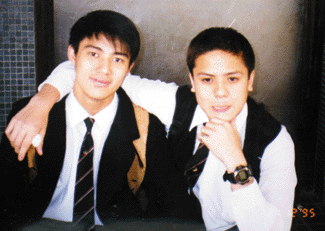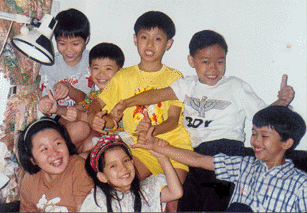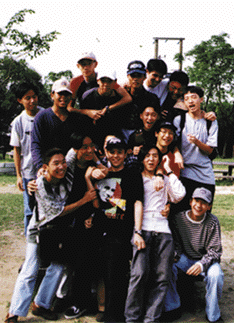No gaposisChinese school discipline welcomed in expat familiesBy Annie Yeung Though rare, there are foreign children studying in local schools and exploring an entirely different culture from their own. Cultural blending with locals gives expats memorable experiences. Marinito Balbuena Jr. has been going to La Salle College Primary 1. His mother is Chinese while his father is a Filipino who acts and thinks more like a Westerner. Being half Filipino and rooted in Western thought because of his father, Marinito might well have entered an international school. Courtesy of Martino Balbuena Jr.
Marinito Balbuena Jr. (right) says, “Even my best friend is Chinese.”But his parents believe that local schools are more disciplined. Marinito said the 11 years at La Salle College have been worthwhile. Said he: “I have made lots of Chinese friends in school. Even my best friend is Chinese. My different nationality has never been an obstacle between us.” Nevertheless, Marinito said international schools would also be suitable for him. “The workload and pressure in international schools is much lighter,” he said. “It also allows more freedom.” His parents’ decision did not give him any regrets. “I have friends who study in international schools. Their lifestyle and hobbies are very different from local school students. “But after all, my prospects are most important. I think studying in La Salle College is better for me.” On the other hand, Billy Boschman, 11, is too young to be bothered by his potential prospects in life. Billy is in Primary 6 at Sai Kung Central Primary School. His father is a Canadian while his mother is a Filipina. He enjoys his school life as much as Marinito does. “I like riding my bike and playing ping-pong with my classmates,” he said. There is just one complaint from this happy schoolboy: too much homework. Billy’s mother, Mrs. Eleanor Boschman, said, “He has suffered from such a heavy workload that he urged me not to put his 3-year-old little brother into a local school.” Miss Poonja Khemlani, a 19-year-old Indian, made her own decision to meet the heavy workload and public exams of local schools. Her parents sent her to Portuguese Community School for her primary education. The school teaches Portuguese as a second language. But when she made a decision about secondary school, she applied to Diocesan Girls’ School. Said she: “I wanted desperately to enter Diocesan Girls’ School because of its good reputation. “My parents wanted me to go to a government-aided school instead of an international one. They think that the former would more disciplined and stricter. They are strict people and believe in moral values.” Courtesy of Roger Boschman
Billy Boschman (in blue striped shirt) and his sister Rogelle (centre) have fun in the Chinese community.Yet, Miss Khemlani admitted she has encountered troubles in building relationships with schoolmates. Miss Katherine Lo Yan Kay, who was one Miss Khemlani’s classmates, said that some foreigners cannot break into the social circles at school. “Most of them didn’t take the initiative to approach others. But if they would take the first step, I’m sure we would accept them.” According to Miss Khemlani, the obstacle to making friends in school was her overdependence on her cousin, who was in the same class with her from Form 1 to Form 5. “We clung to each other all the time. We just didn’t see the need to interact with others,” she said. In Form 6, her cousin left the school, so Miss Khemlani had to survive on her own and make friends with others. She recalled the 2-year matriculation period as the best years of her school life. “I learned that making friends requires both sides to give,” Miss Khemlani said. “The difference in nationality did not hinder us.” Apart from social skills, Miss Khemlani has also gained a lot from other aspects of Chinese school life.. The tough homework and exams taught her to handle things under pressure. Unlike Marinito and Billy, Miss Khemlani can neither read or write in Chinese. She chose to study French in secondary school. This decision was based on her belief that “language is important, not culture.” Said Miss Khemlani: “I could not expect the teachers to teach Indian culture. Culture can be learned at home from our parents.” People have different expectations from school. The parents of Billy and Marinito expect them to learn Chinese at school. Billy’s father, Mr. Roger Boschman, said, “Chinese culture has a long history. Paper, paper money. . . almost everything was started in China.
Courtesy of Martino Balbuena Jr.“Chinese wisdom goes beyond Communism. It’s hard for Western countries to catch up. “For this reason, I hope my children can learn to read and write in Chinese so that they can understand and appreciate the Chinese culture.” Besides, Mr. Boschman said that putting his children in local schools will be beneficial to their careers. “Having learned Chinese, my children will have a terrific advantage, especially in the business world,” he said. According to Mrs. Boschman, there are many other reasons. Said she: “Local schools have good discipline. Besides, it’s much cheaper to study in local schools than in international ones. We only pay for the books, the school bus fees and the school uniform.” Apart from these advantages, Mr. and Mrs. Boschman like local schools because of their good parent-teacher relationships and their facilities. Mrs. Boschman concluded that the communication between teachers and parents is vital for a child’s development. Ms Amena Lee is a teacher at SKH Wei Lun Primary School in Discovery Bay. The school has many students who are foreigners or of mixed blood. To accommodate different levels of achievement in students, the school assesses their Chinese language ability when they first enter the school. Students of similar standards will be put into one class. This enables teachers to monitor the pace of teaching. Miss Lee has been teaching Primary 1 Chinese and mathematics at SKH Wei Lun Primary School for 3 years. Miss Lee is encouraged by the parents’ enthusiasm to help their children learn Chinese. Said she: “The parents are serious about their children’s learning. Some of them even write down the English phonetics beside each Chinese character.” She considers the key to teaching foreign children a new language is patience. “Teaching foreign children Chinese is no easy task,” Miss Lee said. “But when I see the children progress and improve, the satisfaction is beyond words.” Miss Lee said that the foreign children’s social lives seem perfectly normal and happy. Miss Lee said, “In our school, children learn to respect people of different cultures.” “Although some of the children whose
parents are both foreigners do not speak very good Cantonese,” she said, “I
don’t see any problems in their social lives.” |


